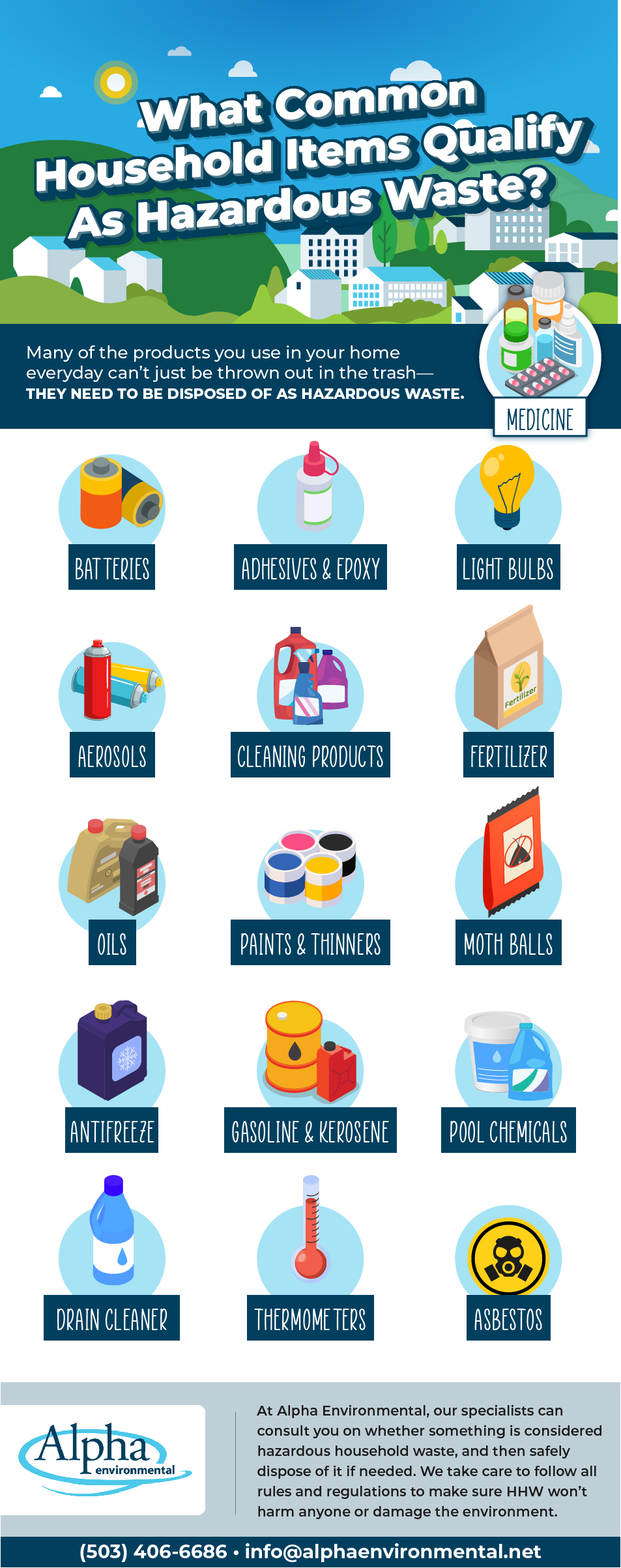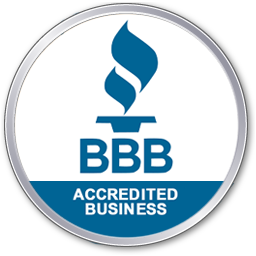Many of the products you use in your home everyday can’t just be thrown out in the trash—they need to be disposed of as hazardous waste.
When disposing of common household products, they’ll fall into 1 of 2 categories of waste:
- Municipal solid waste (trash or garbage): This kind of waste, which isn’t considered potentially harmful to people or the environment, can safely be thrown in trash and recycling bins collected by the city that are then recycled or dumped in the landfill.
- Hazardous household waste (HHW): This is waste that’s potentially harmful to people and/or the environment. The Environmental Protection Agency (EPA) defines hazardous household waste as household products that have the 4 following characteristics:
- Ignitable: Waste that can cause a fire or spontaneously combust in certain situations. Ignitable waste includes:
- Liquids with flashpoints (the temperature at which the liquid’s vapor ignites when exposed to fire) below 60°C
- Non-liquids that can create fires in specific conditions
- Ignitable compressed gasses and oxidizers
- Reactive: Waste that can:
- Be unstable in normal conditions
- React with water
- Give off toxic gasses
- Detonate or explode under normal conditions or when heated
- Corrosive: Water-based wastes that:
- Have a pH (measures the acidity a solution) of 2 or less
- Have a pH of 12.5 or higher
- Can corrode steel
- Toxic: Waste that is harmful to people or animals when ingested or absorbed. Toxic waste has the potential to pollute groundwater.
- Ignitable: Waste that can cause a fire or spontaneously combust in certain situations. Ignitable waste includes:
To be disposed of properly, hazardous waste needs to go in a separate landfill other than where regular trash goes. These specialty landfills are built to protect groundwater and surface water (like lakes, rivers, bays, etc.).
At Alpha Environmental, our professionals understand proper hazardous waste disposal and how important it is to make sure it doesn’t harm people’s health or the environment.
Examples of Household Hazardous Waste
Hazardous household waste includes a lot of products that might not seem hazardous, but can seriously harm the environment if not disposed of safely. Products that are considered hazardous will usually have either “Caution” or “Warning” on the information label.
Common HHW products include:
- Cleaning products
- Aerosols
- Fertilizer
- Light bulbs
- Thermometers
- Paints and thinners
- Adhesives and epoxy
- Oils
- Antifreeze
- Gasoline and kerosene
- Pool chemicals
- Batteries
- Drain cleaner
- Mothballs
- Medicines
While it may not be a “common” household item anymore, asbestos is also considered a hazardous material. It’s normally found in homes built before 1981 and is often illegally dumped. Like the hazardous household materials above, it needs to be disposed of properly to ensure it doesn’t harm anyone or anything.
Importance of Proper Hazardous Waste Disposal
Hazardous household waste can’t be disposed of the way you would dispose of other, organic waste in your home (i.e., pouring it down the drain, throwing it in the garbage, etc.). Doing so may bring harmful effects to the home and/or environment.
Hazardous household waste should never be:
- Put down the sink or toilet. This could cause the product to explode in your plumbing system or pollute the water supply if it passes through the treatment plant untreated. Hazardous household waste can hinder the good, digesting bacteria in septic tanks, which would damage your entire system.
- Dumped on the ground. The HHW can seep into the groundwater or could be washed into lakes, rivers, or storm drains.
- Poured down storm drains. Since storm drains send water directly into creeks and surface water untreated, putting HHW in them can pollute the water supply.
- Thrown in the trash or recycling can. Hazardous waste needs to go in a separate, specially built landfill to prevent it from contaminating the water supply and injuring garbage collection and landfill employees.
- Burned. This causes the HHW to become airborne, which can be more harmful when they’re burned and inhaled.
If you don’t want to have to worry about proper hazardous waste disposal, you can try reducing how much HHW you produce.
Reducing Hazardous Household Waste in Your Home
To help protect the environment and people’s health, you can take steps to reduce how much hazardous household waste you dispose of.
Consider switching to natural, environmentally friendly products when buying items like:
- Multi-purpose and toilet cleaners
- Laundry and dishwashing machine detergents
- Dish and hand soaps
- Insect sprays and pest control
You can also try some DIY solutions or switch to using a tool instead of a corrosive product. To help give you some examples, we’ll outline some DIY solutions you can use instead of products that create HHW:
- Multi-purpose cleaner: Mix ½ cup of white vinegar with 1 tablespoon of baking soda.
- Disinfectant: Mix a 1:1 ratio of water and rubbing alcohol or vodka. If you want, you can add some essential oils for a fresh scent.
- Glass cleaner: Mix 2 tablespoons of vinegar with a quart of warm water.
- Drain cleaner: Use a plunger or plumber’s snake. You can also try pouring 1 cup of baking soda down the drain, followed by ½ cup of white vinegar, and flush the drain with hot water.
- Floor cleaner: Mix 1 cup of white vinegar with 2 gallons of water
- Rug deodorizer: Sprinkle the carpet with baking soda, let it sit for 15 minutes to an hour, then vacuum it up. For stubborn odors, you can spray a 1:1 mixture of white vinegar and warm water on the baking soda and let it dry before vacuuming.
- Furniture polish: Mix a 1:1 ratio of lemon juice and mineral or vegetable oil.
- Scouring powder: Mix 4 tablespoons of baking soda with 1 quart of warm water.
- Mothballs: Create a sachet of a couple or several scents that repel moths: cedar chips, cloves, lavender, thyme, rosemary, mints, bay leaves, and white peppercorns.
If you can’t get around using products that create hazardous household waste, make sure you handle them properly.
Properly Handling Hazardous Household Materials
When handling HHW products, make sure to:
- Use the product as directed. Follow the instructions on the product’s packaging label for information on how to safely use it. HHW products should never be used on anything they’re not designed for or be mixed with other products. This helps prevent any accidents in your home.
- Properly store the product. The product’s label will also outline what conditions the product should be stored in to prevent it from combusting or leaking—and potentially mixing with other leaking hazardous products. Hazardous household materials should be stored in their original containers (never in food containers) with the original label attached.
- Dispose of products properly. Improper disposal creates the risk of the HHW coming into contact with and harming someone or polluting the water supply. Even empty product containers should be disposed of properly, since the container can still have product residue.
You can find more information about proper hazardous waste disposal on the Oregon Metro website, or can call a professional for a consultation if you have questions about a specific product.
Call Us for Proper HHW Disposal in Portland, OR
At Alpha Environmental, our specialists can consult you on whether something is considered hazardous household waste, and then safely dispose of it if needed. We take care to follow all rules and regulations to make sure HHW won’t harm anyone or damage the environment.
Call us today at (503) 292-5346 or contact us online to schedule a free estimate for hazardous waste disposal.





